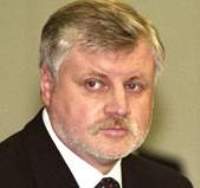NATO, Russia clash over U.S. missile defense

A clash over a controversial U.S. plan for a missile defense system in Eastern Europe took place Monday between Russian top lawmaker and NATO’s chief.
Moscow says it does not believe Washington's contentions that a planned U.S. radar in the Czech Republic and missile interceptors in Poland are aimed against a potential threats from Iran, arguing the shield could be used against Russia.
"Who is this aimed against?" Sergei Mironov, speaker of the Federation Council, the upper chamber of parliament, said during a debate with NATO Secretary General Jaap de Hoop Scheffer that was broadcast on Ekho Mosvky radio. "When there are missiles at our borders ... it is already a threat."
De Hoop Scheffer disagreed, saying the plan represented no danger to Russia because the system would not be effective against Russian missiles.
"If it were true - and in my opinion it is wrong - that they are directly aimed against Russia, but even under those circumstance it would have no effect on Russia," de Hoop Scheffer said.
De Hoop Scheffer said Russian President Vladimir Putin's recent proposal for shared use of a Russia-rented early warning radar in Azerbaijan as an alternative to the plan demonstrated that Moscow also saw a threat from rogue nations, such as Iran.
"There is a threat - and let's call a spade a spade," de Hoop Scheffer said. "For me the positive thing about this proposal is that Russia also perceives this threat as a threat."
Russian officials have insisted, however, that the threat from Iran is only hypothetical and that Putin's offer was made in order to ease tensions and avoid a new arms race, not because of concern over Iran's intentions.
Putin made the proposal to U.S. President George W. Bush after months of bitter criticism of the U.S. plans. Bush agreed to consider the initiative, but the U.S. administration made it clear it was not abandoning plans for the project in Poland and the Czech Republic - former Soviet satellites that are now NATO members.
Russian officials have warned that if Washington were to snub Moscow's proposal, it would strengthen Russia's belief that it is the real target of the U.S. system.
Putin and Bush have agreed to discuss the issue further at talks next month at the Bush family vacation home.
Mironov also expressed Russia's concern over NATO's possible further eastward expansion to include some ex-Soviet states. Georgia and Ukraine have actively campaigned for NATO membership.
Mironov said that while Russia recognized each country's right to join any group or alliance of its choice, "an enlargement in the absence of a real adversary is a seriously provoking factor, which lowers the level of mutual trust."
Russia has watched with growing concern as NATO has expanded to include former Soviet bloc nations such as the three Baltic states, Poland and Hungary. Moscow's relations with Western nations have cooled noticeably in recent months over issues such as the U.S. missile plan and Western criticism of Russia's democratic backsliding.
Subscribe to Pravda.Ru Telegram channel, Facebook, RSS!

